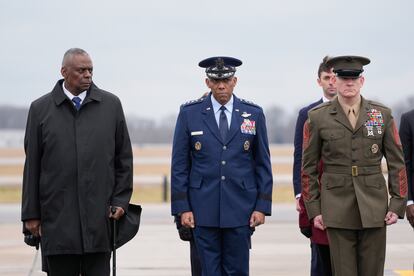An Iranian-backed militia official downplays the US strikes in Iraq and hints at de-escalation
The spokesperson for Harakat al-Nujaba, one of the main Iranian-backed militias in Iraq, in an interview with The Associated Press in Baghdad condemned the U.S. strikes

An Iraqi militia official on Saturday hinted at a desire to deescalate tensions in the Middle East following retaliatory strikes launched by the United States against dozens of sites in Iraq and Syria used by Iranian-backed militias and the Iranian Revolutionary Guard.
Hussein al-Mosawi, spokesperson for Harakat al-Nujaba, one of the main Iranian-backed militias in Iraq, in an interview with The Associated Press in Baghdad condemned the U.S. strikes, saying Washington “must understand that every action elicits a reaction.” But he then struck a more conciliatory tone, saying that “we do not wish to escalate or widen regional tensions.”
Mosawi said the targeted sites in Iraq were mainly “devoid of fighters and military personnel at the time of the attack.”
Syrian state media reported that there were casualties from the strikes but did not give a number. Rami Abdurrahman, who heads the Britain-based Syrian Observatory for Human Rights, said that 23 people, all rank-and-file fighters, were killed,
Iraqi government spokesperson Bassim al-Awadi said in a statement Saturday that the strikes in Iraq near the Syrian border killed 16, including civilians, and there was “significant damage” to homes and private properties.
A U.S. official said Saturday that an initial battle damage assessment showed the U.S. had struck each of its planned targets in addition to a few “dynamic targets” that popped up as the mission unfolded, including a surface-to-air missile site and drone launch sites. The official, who spoke on the condition of anonymity to provide details that were not yet public, did not yet have a casualty assessment.
Iraq’s foreign ministry announced Saturday it would summon the U.S. embassy’s chargé d’affaires — the ambassador being outside of the country — to deliver a formal protest over U.S. strikes on “Iraqi military and civilian sites.”
The air assault was the opening salvo of U.S. retaliation for a drone strike that killed three U.S. troops in Jordan last weekend. The U.S. has blamed that on the Islamic Resistance in Iraq, a coalition of Iranian-backed militias.
Iran, meanwhile, has attempted to distance itself from the attack, saying that the militias act independently of its direction.
Iraqi spokesperson al-Awadi condemned the strikes as a violation of Iraqi sovereignty, particularly since some of them targeted facilities of the Population Mobilization Forces. The PMF, a coalition of Iranian-backed militias, was officially brought under the umbrella of the Iraqi armed forces after it joined the fight against the Islamic State in 2014, but in practice it continues to operate largely outside of state control.
The Popular Mobilization Forces said in a statement Saturday that one of the sites targeted was an official security headquarters of the group. In addition to the 16 killed, it said 36 people had been wounded, “while the search is still ongoing for the bodies of a number of the missing.”
The Iraqi government has been in a delicate position since a group of Iranian-backed Iraqi militias calling itself Islamic Resistance in Iraq — many of whose members are also part of the PMF — began launching attacks on U.S. bases in Iraq and Syria on Oct. 18. The group described the strikes as retaliation for Washington’s support for Israel in the war in Gaza.
Behind the scenes, Iraqi officials have attempted to rein in the militias, while also condemning U.S. retaliatory strikes as a violation of Iraqi sovereignty and calling for an exit of the 2,500 U.S. troops who are in the country as part of an international coalition to fight IS. Last month, Iraqi and U.S. military officials launched formal talks to wind down the coalition’s presence, a process that will likely take years.
One of the main Iran-backed militias, Kataib Hezbollah, said it was suspending attacks on American troops following Sunday’s strike that killed the U.S. troops in Jordan, to avoid “embarrassing” the Iraqi government.
Meanwhile Saturday, the U.S. military’s Central Command acknowledged it had had a series of skirmishes in the Red Sea and the Gulf of Aden with Yemen’s Houthi rebels. On Friday, the USS Carney shot down a drone over the Gulf of Aden and there were no injuries or damage. The U.S. also conducted airstrikes on four Houthi drones preparing to launch that it said “presented an imminent threat to merchant vessels and the U.S. Navy ships in the region.”
Overnight, F/A-18 fighter jets from the USS Dwight D. Eisenhower aircraft carrier, along with the USS Laboon, shot down seven drones in the Red Sea.
Sign up for our weekly newsletter to get more English-language news coverage from EL PAÍS USA Edition
Tu suscripción se está usando en otro dispositivo
¿Quieres añadir otro usuario a tu suscripción?
Si continúas leyendo en este dispositivo, no se podrá leer en el otro.
FlechaTu suscripción se está usando en otro dispositivo y solo puedes acceder a EL PAÍS desde un dispositivo a la vez.
Si quieres compartir tu cuenta, cambia tu suscripción a la modalidad Premium, así podrás añadir otro usuario. Cada uno accederá con su propia cuenta de email, lo que os permitirá personalizar vuestra experiencia en EL PAÍS.
¿Tienes una suscripción de empresa? Accede aquí para contratar más cuentas.
En el caso de no saber quién está usando tu cuenta, te recomendamos cambiar tu contraseña aquí.
Si decides continuar compartiendo tu cuenta, este mensaje se mostrará en tu dispositivo y en el de la otra persona que está usando tu cuenta de forma indefinida, afectando a tu experiencia de lectura. Puedes consultar aquí los términos y condiciones de la suscripción digital.








































